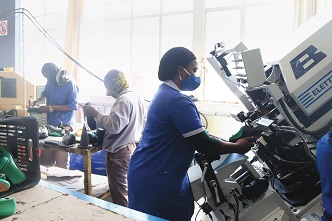Women empowerment through economic emancipation
Department of Social Development 2021/08/22 - 22:00

Every year, in August, our country marks Women’s Month, when we pay tribute to the more than 20 000 women who marched to the Union Buildings on 9 August 1956 in protest the extension of Pass Laws to women.
This year marks 65 years since the watershed 1956 women’s march to the Union Buildings. The year 2021 also marks the twenty-sixth anniversary of the Beijing Plan of Action, which created a platform for greater gender equality in the world.This year’s women’s month commemoration is held under the theme: “The year of Charlotte Mannya Maxeke: Realising Women’s Rights”.Ensuring and protecting rights for all has been a constant struggle for government and our social partners, as we battle the devastating COVID-19 pandemic.Government has made significant progress in empowering women in the political, public, and educational spheres, but the marginalization of poor women severely compromises progress.The Gauteng Social Development strives to empower more women through funding their businesses across the province, amongst others. One such business is the Modipakoma Sewing and Multi-Purpose Primary Cooperative a totally women owned. They continue to inspire women in their neighborhood in Kagiso Extension 12 in the West Rand. It is funded by department and has grown since it was founded.Founded in 2016, after they saw the Gauteng Department of Social Development invite unemployed women with sewing skills to form cooperatives that will manufacture school uniform. Before being awarded a contract to manufacture school uniform they used to sew garments for the locals. The women say it was not easy when they started five years ago, since they did not have skills in running a business. Due to the guidance and the support they got from department they were able to expand and created more jobs. The cooperative now produces school uniform, PPEs, clothes for individuals and church uniforms.They always rope in community members especially women through offering them skills such as sewing skills and are determined to continue, although Covid-19 pandemic is limiting their abilities. These are not the only women who had benefited, a further 500 000 were empowered through the welfare to work (W2W) program.The beneficiaries of W2W are moved from relying on welfare grants to self-reliance. Since 2013 beneficiaries are recruited and trained in Hospitality, Photography, Real Estate, Artisan, Hair and Beauty.
RELATED NEWS
No related news

